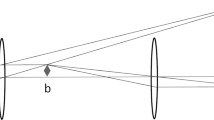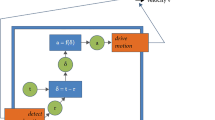Conclusion
Although the historical dispute between introspective psychology and ontological behaviorism encourages the belief that attitudes do not exist, this belief is misguided. Even the Hacking test, suggested by someone with grave doubts about behavioral science, supports the claim that attitudes are “just as real as neutrinos.” Nevertheless, the progress of a science of attitudes may be severely limited by the influence of exogenous factors, factors including normative beliefs about how we should treat the people to whom attitudes are attributed. In so far as these beliefs prevent scientists from experimenting on people and their institutions, particle physics has resources unavailable to survey research. Thus a serious examination of behavioral science leads to some surprising conclusions as to which sciences are the “hard” ones and which ones are simply easier.
Similar content being viewed by others
References
Abelson, Robert (1972) “Are Attirtdes Necessary?” in Attitudes, Conflict and Social Change Bert T. King and Elliott McGinnies (eds.) New York and London: Academic Press.
Babbie, Earl (1986) Observing Ourselves. Belmont, California: Wadsworth Publishing.
Burnham, Walter Dean; Paul R. Abramson: Thomas R. Dye; Bernard Grofman; Charles O. Jones; D. Roderick Kiewiet; Warren E. Miller; Lee Seiglman; and Robert Weissberg. (1984) “Is the Democratic Party Dissintegrating?” in Society 21: 5–42.
Candler, Marthe (1988) “Models of Voting Behavior” in Synthese 76: 25–48.
Converse, Jean (1987) Survey Research in the United States: Roots and Emergence, 1890–1960. Berkeley: University of California Press.
Converse, Philip E. (1970) “Attitudes and Non-Attitudes: Continuation of A Dialogue,” in The Quantitative Analysis of Social Problems edited by Edward R. Tuft. Reading, Mass.: Adison-Wesley Publishing Company.
Dahl, Robert A. (1960), “The Behavioral Approach in Political Science: Epitaph for a Monument to a Successful Protest,” in The American Political Science Review.
Davidson, Donald (1970) “Mental Events”, in Experience and Theory, edited by Lawrence Foster and J. W. Swanson. The University of Massachusetts Press.
Duncan, Otis Dudley. (1986) “Probability, Disposition, and the Inconsistency of Attitudes and Behavior,” Synthese 68: 65–98.
Fetzer, James. H. (1977) “A World of Dispositions,” Synthese 34: 397–421.
Fine, Arthur. (1984a) “And Not Anti-Realism Either,” Nous, 18: 51–65.
Fine, Arthur. (1984b) “The Natural Ontological Attituded” in Scientific Realism J. Leplin (ed.) Berkeley, California: University of California Press.
Graham, George and Horgan, Terence. (1988) “How to be Realistic about Folk Psychology”, Philosophical Psychology 1: 69–81.
Hacking, (1983a) Representing and Intervening. Cambridge: The Cambridge University Press.
Hacking,(1983b) “The Autonomy of Statistical Law,” in Scientific Explanation and Understanding, Nicholas Rescher (ed.) Lanham, Md: University Press of America, Inc.
Hacking, (1984a) Comments on “And Not Anti-Realism Either” presented at the meeting of the Western Division of the American Philosophical Association, April, 1984.
Hacking, (1984b) “Experimentation and Scientific Realism”, in Scientific Realism J. Leplin (ed.) Berkeley, California: University of California Press.
Hempel, Carl G. (1965) “A theoreticians Dilemma: A Study in the Logic of Theory Construction” in Aspects of Scientific Explanation. New York: The Free Press.
Hill, Richard J. (1981), “Attitudes and Behaviors”, in Social Psychology, Morris Rosenberg and Ralph H. Turner (eds) New York: Basic Books, Inc. Hovland, C. I. (1959), “Reconciling Conflicting Results Derived from Experimental and Survey Studies of Attitude Change,” American Psychologist 14: 8–17.
Jelen, Ted (1987) “The Effects of Religious Separatism on White Protestants in the 1984 Election,” in Sociological Analysis 48: 30–45.
MacIntyre, Alasdair (1973) “Is A Science of Comparative Politics Possible?” in The Philosophy of Social Explanation edited by Alan Ryan, Bristol, England: Oxford University Press pp. 171–188.
Norpoth, Helmet and Milton Lodge (1985) “The Difference between Attitudes and Nonattitudes in the Mass Public: Just Measurements?” American Journal of Political Science 29: 291–307.
Pierce, John C. and Rose, Douglas D. (1974) “Nonattitudes and American Public Opinion: The Examination of a Thesis” in The American Political Science Review 68: 626–649.
Pratkanis, Anthony R. and Greenwald, Anthony G. (1989) “A Sociocognitive Model of Attitude Structure and Function” in Advances in Experimental Social Psychology Leonard Berkowitz (ed.) Volume 22: 245–285 San Diego: Academic Press, Inc.
Reines, Frederick and J. P. F. Sellschop (1966) “Neutrinos from the Atmosphere and Beyond,” Scientific American 40–48.
Rosenberg, Alexander (1983) “Human Science and Biological Science: Defects and Prospects”, in Scientific Explanation and Understanding, Nicholas Rescher (ed.) Lanham, MD: University Press of American, Inc.
Schuman, Howard and S. Presser (1981) Questions and Answers on Attitude Surveys. New York: Academic Press.
Schuman, Howard; Charlotte Steeh and Lawrence Bobo (1985) Racial Attitudes in America: Trends and Interpretations Cambridge, Massachusetts: Harvard University Press.
Smith, Laurence D. (1986) Behaviorism and Logical Positivism: A Reassessment of the Alliance. Stanfard University Press: Stanford, California.
Smith, Tom W. (1984) “Nonattitudes: A Review and Evaluation,” in Surveying Subjective Phenomena, Volume 2, edited by Charles F. Turner and Elizabeth Martin. Russell Sage Foundation: New York.
Summers, Gene F. (1970) (ed.) “Introduction” to Attitude Measurement, Chicago: Rand McNally and Company.
Wahlke, John C. (1979) “Presidential Address, American Political Association, 1978,” American Political Science Review: 9–31.
Zaller, John (1988) “Vague Minds vs. Vague Questions: An Experimental Attempt to Reduce Measurement Error” unpublished: University of California, Los Angeles.
Author information
Authors and Affiliations
Additional information
Thanks are due to a number of people, particularly to Ted Jelen for invaluable advice and encouragement and editorial assistance and to Paul Teller, Dorothy Grover and my colleagues in the Indiana Philosophical Association for helpful and insightful comments. Research for this paper was supported by Faculty Development of DePauw University and the Humanities Division of Illinois Benedictine College.
Rights and permissions
About this article
Cite this article
Chandler, M. Attitudes, leprechauns and neutrinos: The ontology of behavioral science. Philosophical Studies 60, 5–17 (1990). https://doi.org/10.1007/BF00370972
Received:
Issue Date:
DOI: https://doi.org/10.1007/BF00370972




